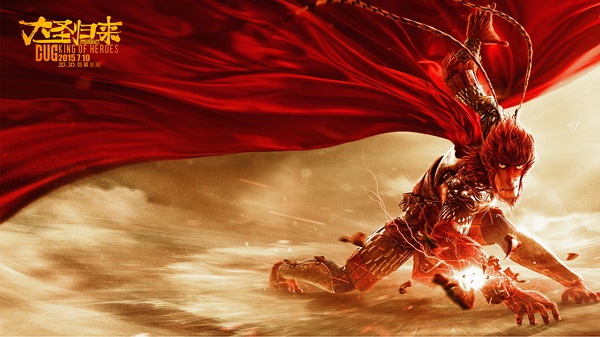 |
|
The 3-D animated movie Monkey King: Hero Is Back becomes the highest-grossing animated movie in the history of Chinese cinemas. [File photo] |
Regarding the monkey's new screen image as "a successful adaptation", Chen Xuguang, vice-president at the School of Arts of Peking University, says the protagonist combines the characteristics of traditional Chinese heroes and Hollywood superheroes.
"His inherent anxiety and murmuring easily strike a chord with the 20-somethings who undergo stress nowadays," Chen says.
Intriguingly, the movie didn't make a big splash at the very beginning.
It opened on July 10 and only got a screening-market share of 9.2 percent. It was squeezed by two fan-boosted, coming-of-age titles, Tiny Times 4.0 (July 9) and Forever Young (July 10), which each took 30-plus percent on the same day.
Usually, a blockbuster needs a debut share of 30 percent, and the screenings drop after several days. The limited screening and resulting ticket sales meant Chinese cinemas didn't think it had much market potential.
With its unexpected popularity on the Internet, however, Hero Is Back made a comeback. On July 15, its share peaked at 24 percent, beating all rivals to top the single-day box office.
"I never expected it would be so successful," says Tian, who told domestic media Chinese audiences have suffered through many "lousy movies" and are excited to find a good-quality, low-profile title.
"Almost every Chinese in the 1980s grew up with the hit series Journey to the West. Our title is standing on the shoulders of a giant, which makes it easier to garner attention," the 40-year-old director says.
A new sensation - "shuijun", or "tap-water army" - refers to enthusiasts who spontaneously support a movie on the Internet with a flood of posts and reviews on popular online platforms.
However, some movie critics are cautious about the so-called triumph for Chinese-language animated movies.
"The scenes narrated from the child monk's viewpoint seem a bit boring and childish. There is still a lot to improve in storyline and implication," writes Han Haoyue, a veteran film critic at the Beijing-based Beijing Times.